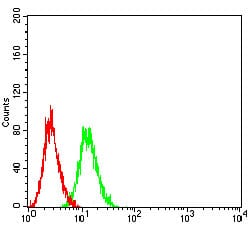



| WB | 咨询技术 | Human,Mouse,Rat |
| IF | 咨询技术 | Human,Mouse,Rat |
| IHC | 1/200 - 1/1000 | Human,Mouse,Rat |
| ICC | 技术咨询 | Human,Mouse,Rat |
| FCM | 1/200 - 1/400 | Human,Mouse,Rat |
| Elisa | 1/10000 | Human,Mouse,Rat |
| Aliases | SEMA4D; SEMAJ; coll-4; C9orf164; M-sema-G |
| Entrez GeneID | 10507 |
| clone | 5C5B10 |
| WB Predicted band size | 96.2kDa |
| Host/Isotype | Mouse IgG1 |
| Antibody Type | Primary antibody |
| Storage | Store at 4°C short term. Aliquot and store at -20°C long term. Avoid freeze/thaw cycles. |
| Species Reactivity | Human |
| Immunogen | Purified recombinant fragment of human CD100 (AA: extra 590-734) expressed in E. Coli. |
| Formulation | Purified antibody in PBS with 0.05% sodium azide |
+ +
以下是3篇与CD100(SEMA4D)抗体相关的研究文献摘要:
---
1. **文献名称**:*Anti-SEMA4D monoclonal antibody prevents collagen-induced arthritis by modulating immune cell functions*
**作者**:Kumanogoh, A., et al.
**摘要**:研究证明抗SEMA4D单克隆抗体通过抑制CD100(SEMA4D)与其受体PLXNB1的相互作用,减少促炎细胞因子释放,并缓解小鼠胶原诱导性关节炎模型中的炎症反应,提示其在自身免疫疾病中的治疗潜力。
---
2. **文献名称**:*SEMA4D blockade improves tumor immunity via CD8+ T cell activation*
**作者**:Evans, E.E., et al.
**摘要**:该研究发现,靶向SEMA4D的抗体(VX15/2503)可阻断肿瘤微环境中SEMA4D介导的免疫抑制信号,增强CD8+ T细胞的浸润和活性,抑制多种小鼠肿瘤模型的生长,为癌症免疫治疗提供新策略。
---
3. **文献名称**:*The role of SEMA4D/CD100 in B cell activation and autoimmune pathogenesis*
**作者**:Hall, K.T., et al.
**摘要**:文章阐明了SEMA4D在B细胞活化中的关键作用,使用抗CD100抗体阻断其功能可减少自身抗体产生,缓解系统性红斑狼疮(SLE)模型小鼠的疾病进展,表明靶向CD100可能治疗B细胞介导的自身免疫病。
---
如需更具体的文献或全文链接,可进一步提供研究方向(如肿瘤、神经或免疫疾病)。
CD100 antibody targets CD100. also known as SEMA4D (Semaphorin-4D), a transmembrane protein belonging to the semaphorin family. Initially identified as a neuronal guidance molecule, CD100 plays dual roles in immune regulation and nervous system development. Structurally, it contains a conserved Sema domain, a plexin-semaphorin-integrin (PSI) domain, and an immunoglobulin-like motif. In the immune system, CD100 is expressed on T cells, B cells, and antigen-presenting cells (APCs). It interacts with receptors like CD72 and plexin-B1/B2. modulating immune cell activation, adhesion, and migration. CD100 enhances T-cell priming, promotes B-cell differentiation, and facilitates APC-T cell interactions.
In pathological contexts, CD100 is implicated in autoimmune diseases and cancer. Elevated CD100 expression correlates with tumor progression, angiogenesis, and metastasis by promoting invasive signaling in the tumor microenvironment. Conversely, in autoimmunity, dysregulated CD100 signaling may contribute to chronic inflammation.
Therapeutic CD100 antibodies are designed to block these interactions. For example, anti-CD100 antibodies (e.g., VX15/2503) have been explored in clinical trials for cancers and neurological disorders. By inhibiting CD100-mediated pathways, these antibodies aim to suppress tumor growth, reduce inflammation, or mitigate neuroinflammatory damage. Research continues to clarify its pleiotropic functions and optimize targeting strategies for precision therapies.
×